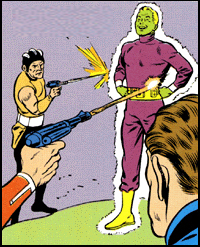
Can there be democracy without liberalism? Not for more than a moment. Jonah Goldberg laments that "we don't even have the language to talk about the nobility or merits of classical liberalism independent of democracy because ever since the Progressive era it's been taken as a given that enlightened rule is anything but classically liberal."
By all means, invest liberalism and then hold a popular election. What is (sadly always) missing from this debate is a distinction between principle- and practice-driven democratization; the former favored by transnationalists and the latter exercised singularly, if brilliantly, in postwar Germany and especially Japan.
Principle-driven democratization is reform in theory. It is based on the contention — really, the pretension — that simply gifting a fair ballot to a population will accurately and beneficially reflect national will. Of course, this is nonsense: if a liberal society with a rule of law is not in place, authoritarian parties will do what is necessary to conduct a nominally legitimate election, then assume power and promptly dismantle the pluralist system that brought them to power. Even if fraud is undetectable, intimidation will be culturally expressed — take Hamas' victory. What Palestinian in his right mind would have run on a platform of conciliation with Israel? Surely many Palestinians want nothing to do with bloodshot, anti-Semitic irredentism. Where was their representation? Dead, in prison or in hiding, hoping to win office by way of a write-in. And yet, to transnationalists and reactionaries, Palestinian elections were an exercise in democracy.
Practice-driven democratization is the answer to groups like Egypt's Muslim Brotherhood, bogeymen of liberalization's opponents. Simply put, practice-driven is smart pluralism: parties transparently dedicated to sundering civil society should not be allowed to participate. When charged with desecrating the sacrosanctity that is free speech, the practice-driven democratist might counter with questioning the wisdom of inviting baby-snatchers into maternity wards. General Douglas MacArthur exemplified practice-driven work in his jurisdiction of Occupied Japan. He tolerated the Moscow-directed socialists led by Kyuichi Tokuda only until February 2, 1947, when an inimical general strike was attempted by the socialists but — in abrogation of recently promulgated civil rights — prevented by Allied authorities. In the following years, particularly after Washington's Cold War-minded "reverse course" in occupation policy, the Japanese government conducted "red purges" and effectively ended Communist interference in the affairs of that country.
Most desirable to democratists are countries that are moving towards electoral democracy — Kuwait, Jordan, Bahrain, former Soviet acquisitions, and so forth. For those nations contending with authoritarians capable of manipulating the very operation intended to establish popular rule — one vote, once, The End — the state or foreign guardian cannot judge political forces equally.
There is more on this subject; in fact I have had an article about the election of Hamas half-finished for four months. I will publish as I can.
There are advantages to an apostrophic language. Although references to Star Trek are, at The Corner, verboten, warden Kathryn Jean Lopez may not object to something derived from Gene Roddenberry's legacy if the Corner can make entertaining — and elucidating — use of it. National Review could introduce an idiosyncratic shorthand for the political internet.
For example:
"Ted Kennedy — his hands black and his nose red," denoting excess.
"Jim Jeffords, in the bargain bin," denoting ephemera.
"Andrew Sullivan, yesterday?" denoting gainsaying.
"Senator Stevens with the pursestrings," denoting extravagance.
"Nancy Pelosi, her speech notes scattered," denoting sudden and inextricable confusion.
"Orrin Hatch, yelling," denoting the physically impossible.
"Derb and humanity," denoting sullen, if thoughtful, resignation.
"Kofi Annan in jail," denoting the frustration of unmet justice.
"Bill Buckley and Daniel Patrick Moynihan," denoting common cause.
We are told three things. First, with certainty, that Oklahoma Senator James Inhofe introduced an amendment to an immigration bill asseverating the language of the American government as that written and spoken, historically, by the people: English.
Second, on good if qualified authority, that Nevada Senator Harry Reid called the amendment "racist," wielded to punish those of Latinate tongues, and went on to say "I have three sons that speak Spanish, fluent Spanish. One of them lived in Argentina a couple years. One lived in Ecuador, one lived in Spain. They speak fluent Spanish."
Can't Senator Reid, one wonders, follow through to the corollary of his sons' linguistic training? His sons learned Spanish — why? Because that is what is spoken and indited in Argentina and Ecuador and Spain, that which is the official language of the state; which one would be a sorry boor to contravene.
Third thing, with as much certainty as the first: the amendment passed 63 to 34.
Diplomatic relations with the military dictatorship of Libya, long in the deep freeze, have been thawed as per a speech given today by Secretary of State Condoleezza Rice. Michael Rubin, the democratist who tells you always how he would have done it, has written to National Review's Kathryn Jean Lopez, who herself describes her mood following the news as "depressed," that "from the Middle East perspective" — which is surely to say, from his — President Bush is a big fibber on democracy.
Please. Calm down.
The last two lines of a recent post of Richard Fernandez's paraphrased Sun Tzu in reference to "a way in which one's adversary can accede to [one's] demands without losing face or suffering undue public humiliation." Fernandez was writing about Egypt, but I immediately thought of Libya. Moammar Gadhafi may be geopolitically benign but he is still a crackpot megalomaniac; it was good work and good fortune that his WMD exposé occurred shortly after the end of Ba'athist Iraq. The mad colonel will likely never return to his Reagan-era opprobrium yet short of his death or military deposition and the prevented accession of his son, democratist reform will not come to Libya at the expense of his autarchy.
Gadhafi is the only dictator who blinked in 2003. That has got to mean something in those circles. He probably can't be pushed any further, and without reciprocity like diplomatic reconciliation there is a risk of recidivism that will increase with time. Topple Gadhafi? Not before Bashar Assad, or Kim Jong Il, or the Khomeinist mullahs. So force is out. The president rightly knows that while driven by principle he is judged by practice, and that engaging Libyans themselves will be remembered; standing still for the sake of Michael Rubin's immaculate ideal never heard of again.
Like a rosebud to thorns, the Wall Street Journal's rightist editorial page lies ensconced in one of the furthest leftward American newspapers. Today, on those gauche pages, an article on Apache renegade Geronimo just short of historical fiction:
The grave of the famed warrior has long been rumored to have been robbed during World War I by a small group of young military officers that included Prescott Bush, the president's late grandfather, and other members of Yale University's secretive Skull and Bones society.
Presumably, the New York Times will bookend the week with the front page publication of a story under the headline "Holy Grail on Bush Estate: Family Heirloom Retrieved from Ottoman Expedition, Used as Ashtray."

The staff of uBlog apologizes for the continued lack of new material. Operations has zeroed in on the problem inside this fine expressions and opinions factory (Est. 2002) and — good news — the trouble is with assembly and not design. Conveyor One is running slow and our engineers have been preoccupied with both administrative crises and the methodical review of new source material; but, rest assured, we shall and will continue to produce. Never complacent, we keep images of declining trends in the backs of our at-capacity minds.
However, since the inference can be made that uRead, we must still be doing something right.
Sung to the melody of Isaac Hayes' "Shaft."
Who's the last and best hope
That's wise to the democratist dopes?
(Shaft!)
Damned far right!
Which hegemon
Won't call or write but if pushed, just might bomb?
(Shaft!)
Do ya get it?
Who's not gonna bail you out
When Election Day goes south
(shaft!)
Right-wing!
You see this capital's got bad mothers
(Shut your mouth!)
I'm talking about silos
(Then you might get it)
An uncomplicated plan
But those who understand it don't have power
(As per Jonah Goldberg's request for a foreign policy conservative's anthem.)
You mean to say that the housing market fluctuates, instead of flagging before an ignominious, hubristic collapse? Now that the "growing consensus" predicting an economic slowdown has been shown to be in error, Martin Crutsinger, market journalism's own Joe Bfstplk, tacks:
Sales of existing homes unexpectedly rose last month as a warmer than usual winter boosted demand in many parts of the country, but a slack demand in some areas produced what one analyst called a "tale of two cities."
Bless that man for perspicuity not seen beyond Corinth! Remarkably, the Associated Press can still feign surprise at votes of low confidence among consumers who read its reports.

The Golden Rule, brought to you by Dig 'Em of Kellogg's Honey Smacks. I have written more elegantly contra Rod Dreher and his haute cuisine pietism but for this: "Crunchy Conservatism" is crap, crap, crap.
If satisfaction in personal computing is asymptotic, this is the closest to silicon Elysium yet: Jinx built herself a sleek, fast, six-sided chrome homage to the heroine of Metroid.
